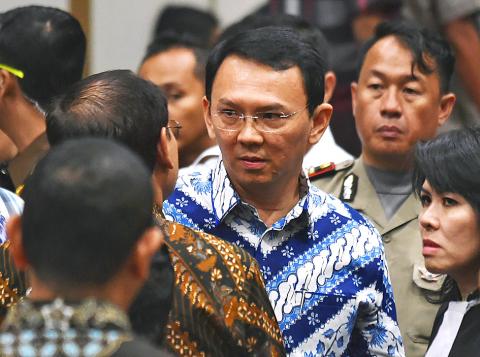Jakarta’s Christian governor was yesterday jailed for two years after being found guilty of blasphemy, in a shock decision that has stoked concerns over rising religious intolerance in the world’s most populous Muslim-majority nation.
Islamic hardliners outside the Jakarta court shouted “God is the greatest” as news came through that Basuki Tjahaja Purnama would be sent to prison for insulting Islam, a surprisingly harsh punishment after prosecutors recommended only probation.
Purnama, Jakarta’s first non-Muslim governor in half a century and its first ethnic Chinese leader, looked calm when the verdict was announced and said he would appeal, as some of his supporters in court burst into tears.

Photo: Reuters
He was immediately transferred to jail and authorities said his deputy would take over running Jakarta for the final few months of his term.
Hundreds of his supporters descended on the prison shouting “Free Ahok” — Purnama’s nickname — and shook the gate of the facility.
The 50-year-old was hauled into court last year to face trial on charges of insulting the Koran while campaigning for re-election, after the blasphemy accusations sparked a series of mass protests in Jakarta spearheaded by radical groups and encouraged by his rivals.
Yesterday’s jail sentence and his loss last month to a Muslim challenger in the Jakarta vote, which he had once been favorite to win, has fueled fears that hardliners are growing increasingly influential and that the nation’s much-vaunted tolerant brand of Islam is under threat.
“It’s another big step in the slow decline of religious freedom in Indonesia,” Human Rights Watch Indonesia researcher Andreas Harsono said after Purnama was jailed. “If someone of that political stature can be charged and sent to prison, what will happen to others?”
Indonesia, 90 percent of whose 255 million people are Muslim, has a long tradition of pluralistic values and is home to substantial populations of Christians, Hindus and Buddhists, but there has been a rise in attacks on minorities.
The five-judge panel at the Jakarta court found Purnama guilty of blasphemy after a months-long trial, in a case criticized as politically motivated.
Announcing the verdict, Presiding Judge Dwiarso Budi Santiarto said Purnama was “convincingly guilty of committing blasphemy and is sentenced to two years in prison” and ordered him to be detained.
Blasphemy carries a maximum jail term of five years in Indonesia, but the sentence was a surprise as judges typically follow the recommendation of prosecutors — in this case, they had proposed two years probation.
Analysts said the shock verdict could be a result of Purnama’s political rivals putting pressure on the nation’s notoriously corrupt judiciary to remove him from power as soon as possible.
Despite the trial, Purnama retained a loyal following in Jakarta due to his determination to clean up the traffic-clogged and polluted city, and his supporters rallied outside the court and the prison.
“Ahok is innocent and he doesn’t deserve this — he has done good things for us and the city,” said Sari Puji Astuti, 47, as she fought back tears.

Taiwan is projected to lose a working-age population of about 6.67 million people in two waves of retirement in the coming years, as the nation confronts accelerating demographic decline and a shortage of younger workers to take their place, the Ministry of the Interior said. Taiwan experienced its largest baby boom between 1958 and 1966, when the population grew by 3.78 million, followed by a second surge of 2.89 million between 1976 and 1982, ministry data showed. In 2023, the first of those baby boom generations — those born in the late 1950s and early 1960s — began to enter retirement, triggering

One of two tropical depressions that formed off Taiwan yesterday morning could turn into a moderate typhoon by the weekend, the Central Weather Administration (CWA) said yesterday. Tropical Depression No. 21 formed at 8am about 1,850km off the southeast coast, CWA forecaster Lee Meng-hsuan (李孟軒) said. The weather system is expected to move northwest as it builds momentum, possibly intensifying this weekend into a typhoon, which would be called Mitag, Lee said. The radius of the storm is expected to reach almost 200km, she said. It is forecast to approach the southeast of Taiwan on Monday next week and pass through the Bashi Channel

NO CHANGE: The TRA makes clear that the US does not consider the status of Taiwan to have been determined by WWII-era documents, a former AIT deputy director said The American Institute in Taiwan’s (AIT) comments that World War-II era documents do not determine Taiwan’s political status accurately conveyed the US’ stance, the US Department of State said. An AIT spokesperson on Saturday said that a Chinese official mischaracterized World War II-era documents as stating that Taiwan was ceded to the China. The remarks from the US’ de facto embassy in Taiwan drew criticism from the Ma Ying-jeou Foundation, whose director said the comments put Taiwan in danger. The Chinese-language United Daily News yesterday reported that a US State Department spokesperson confirmed the AIT’s position. They added that the US would continue to

The number of Chinese spouses applying for dependent residency as well as long-term residency in Taiwan has decreased, the Mainland Affairs Council said yesterday, adding that the reduction of Chinese spouses staying or living in Taiwan is only one facet reflecting the general decrease in the number of people willing to get married in Taiwan. The number of Chinese spouses applying for dependent residency last year was 7,123, down by 2,931, or 29.15 percent, from the previous year. The same census showed that the number of Chinese spouses applying for long-term residency and receiving approval last year stood at 2,973, down 1,520,